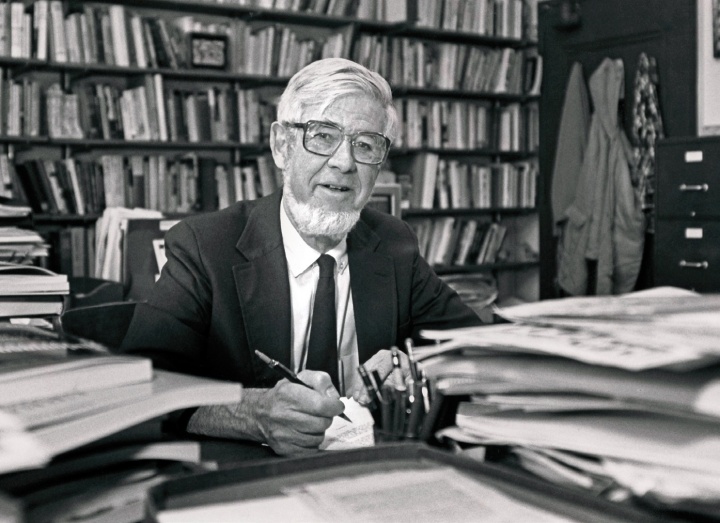Columbia College | Columbia University in the City of New York
In Memoriam: Herbert J. Gans, Eminent Social Critic and Author

COURTESY COLUMBIA UNIVERSITY ARCHIVES
Born on May 7, 1927, in Cologne, Germany, Gans and his parents fled to England on New Year’s Eve in 1938 and then to the United States in 1940, settling in Chicago. His father took a job as a door-to-door salesman, his mother as a maid and Gans as a newspaper seller. He became a U.S. citizen in 1945 and served 14 months in the Army. Gans then earned his bachelor’s in 1947 and his master’s in 1950, both from the University of Chicago. There, he studied under sociologists Earl Johnson and Everett Hughes, who stressed the importance of urban field work. Gans earned his Ph.D. from Penn in 1957, studying primarily with Martin Meyerson, a prominent scholar of urban design.
From 1950 to 1953 Gans was a planner in private and public agencies, including an architectural firm where his social research helped to plan two new towns. He also worked at HHFA, predecessor to the Department of Housing and Urban Development. In 1953 Gans turned to academia and from then until 1964 he taught urban studies at Penn. Gans then taught sociology at Teachers College from 1964 to 1969 and at MIT from 1969 to 1971. He joined the Columbia faculty in 1971, becoming the Robert S. Lynd Professor of Sociology in 1985 and professor emeritus upon his 2007 retirement.
One of the nation’s most influential social critics, Gans wrote a dozen books and hundreds of articles that shaped the thinking of government and corporate policymakers, colleagues in sociology and a wide public audience. His writing explored race relations, economic problems and nostalgia for the rural past, and posed provocative questions, as noted his New York Times obituary: “Why do the poor get poorer and the rich richer? Can Jews and Italians get along in Canarsie? Is landmarks preservation elitist?”
His books include The Urban Villagers: Group and Class in the Life of Italian-Americans (1962); The Levittowners: Ways of Life and Politics in a New Suburban Community (1967); The Urban Villagers: Group and Class in the Life of Italian-Americans (1982); The War Against the Poor: The Underclass and Anti-Poverty Policy (1995); Democracy and the News (2003); Imagining America in 2033: How the Country Put Itself Together After Bush (2009); and Sociology and Social Policy: Essays on Community, Economy, and Society (2017).
Gans’ writing was supplemented by his advocacy: He advised urban planning, anti-poverty and other public policy agencies, aiming to look at American society from the perspective of its working and lower middle-class majority. He also was a liberal activist, opposing the Vietnam War and the Nixon administration’s efforts to muzzle the press; testifying for comedian Lenny Bruce in his 1964 obscenity trial; campaigning for the release of imprisoned sociologists in Communist Hungary; and consulting for antipoverty programs and city planners.
Gans drafted part of the Kerner Commission’s 1967 report on the causes of race riots of that time, and testified that the uprisings were due, above all, to segregation and unemployment, and that only a national jobs program, desegregation and income-redistribution efforts could solve the crisis. In 2010, he wrote a letter to Spectator publicly opposing ROTC as being “in part a leadership training pro- gram for the killing of other people and the destruction of their societies.”
As president of the American Sociological Association (ASA) from 1988 to 1989, Gans urged colleagues to get closer to their subjects and to write more intelligibly. In his presidential address, he also urged the discipline to become more useful to and relevant for the general public, using the term “public sociology,” which 20 years later became the centerpiece of a reform movement within the discipline. The ASA recognized Gans’ contributions with its 1999 Public Understanding of Sociology Award and its 2006 W.E.B. Du Bois Career of Distinguished Scholarship Award. And in 2011 several of his former students put together a Festschrift, a collection of essays in his honor. The subtitle they chose — “American Democracy and the Pursuit of Equality” — had him figured out, Gans reflected: “I think those are the two themes that go through much of my work.”
Gans’ first marriage, to Iris Lezak, an artist, ended in divorce. In 1967, he married Louise Gruner, a lawyer, who survives him as does their son, David, and a grandson.
Issue Contents
Published three times a year by Columbia College for alumni, students, faculty, parents and friends.
Columbia Alumni Center
622 W. 113th St., MC 4530, 6th Fl.
New York, NY 10025
212-851-7852
cct@columbia.edu
Columbia Alumni Center
622 W. 113th St., MC 4530, 4th Fl.
New York, NY 10025
212-851-7488
ccalumni@columbia.edu

